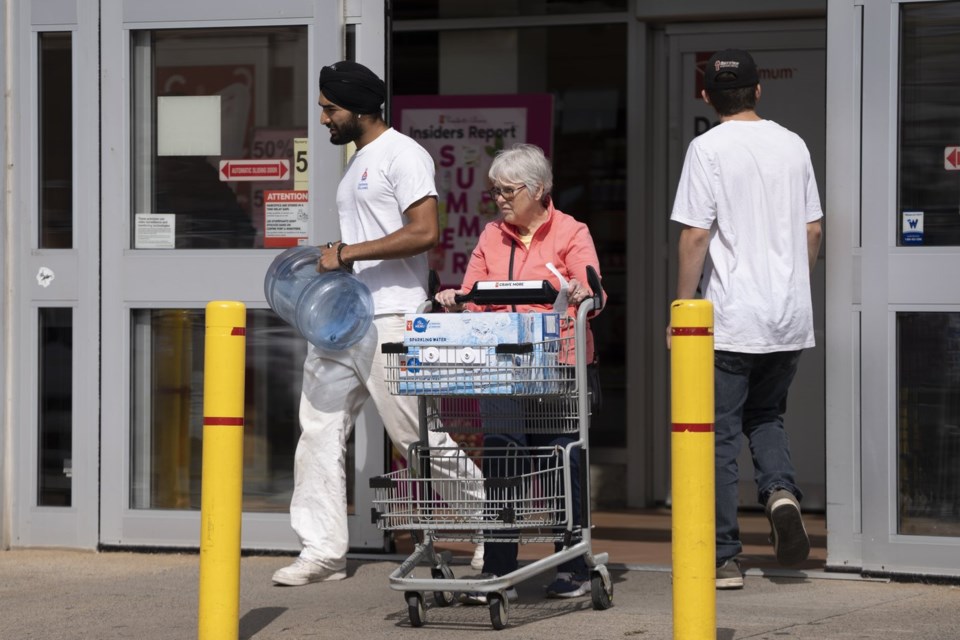HALIFAX — Grocery stores in Halifax started selling out of bottled water on Tuesday, after an electrical problem at a treatment facility led to a boil-water advisory affecting more than 200,000 people.
Residents of Halifax and suburbs that are serviced by the Pockwock Lake treatment facility were advised to boil all water for at least one minute before using it for consumption, including for drinking, cooking, preparing infant formula and brushing teeth.
Halifax Water issued the advisory Monday evening. The utility said an internal electrical issue at the Pockwock Lake facility allowed "a limited amount of unchlorinated water to enter the system." The boil order, affecting roughly 201,000 people, was estimated to last between 24 to 48 hours.
The "precautionary" advisory is meant to prevent adverse health effects from drinking unchlorinated water, Nova Scotia regional medical officer of health Dr. Monika Dutt said, adding that people who are immunocompromised or infants using formula are most at risk.
Neither the Environment Department nor the city's utility have found traces of viruses or bacteria in the water, Dr. Dutt said in an interview. "No actual tests have shown that currently there is a risk to the public; however, as a precaution, they put (the advisory) in place."
On Tuesday, some daycares, restaurants and coffee shops in the Halifax area were closed.
Hospitals — including both QEII Health Sciences Centre campuses, and the Cobequid Community Health Centre in Lower Sackville — said they were using waterless bath products to clean patients, and urged anyone with open skin wounds to avoid showers. Nova Scotia Health spokesperson Brendan Elliott said "a couple of dozen" endoscopy procedures were cancelled.
By Tuesday morning grocery stores in Halifax started selling out of bottled water, including at both the Mumford Road and Queen Street Sobeys locations. Across the harbour, one worker at Wyse Road Sobeys in Dartmouth — where residents get water from a different treatment facility — confirmed bottled water was still on the shelves. Although water deliveries were expected Tuesday night in both Halifax and Dartmouth, it wasn't clear how much each Sobeys would receive.
Loblaws stores in the region contacted by The Canadian Press would not confirm whether they had sold out of water. Company spokesman Dave Bauer said hundreds of cases of bottled water were en route to stores in the affected areas, adding that Loblaws was limiting customers to purchasing three 24-bottle cases and four one-litre bottles at a time.
For the north-Halifax coffee shop Ramblers, opening Tuesday morning required pivoting to a limited menu and using bottled water in the espresso machine.
Ramblers owner Elly Hannon said her shop was "super busy" Tuesday, with customers cycling through two 18-litre jugs of water she purchased from Atlantic Superstore. The coffee shop had no drinking water to distribute and offered hand sanitizer in bathrooms. Hannon said she closed an hour-and-a-half early to stock up on boiled water for customers on Wednesday.
"It was a really interesting experience having to do a crash course in public health as a barista and a café owner," Hannon said.
"People come in assuming whatever you're doing is safe just because you're doing it, and you really have people's safety in your hands whether its high risk or low risk."
Nova Scotia Liberal Party Leader Zach Churchill issued a statement Tuesday morning criticizing the delay in the provincial emergency alert system. Halifax Water issued the boil-water advisory Monday to media at 6:03 p.m., and a message was sent through the alert system at 8:49 p.m.
Calling the delay "unacceptable," Churchill said, "It should be standard practice for the province to issue an emergency alert as soon as it becomes aware of the issue."
The utility said staff were working on options to flush the untreated drinking water out of the system, as it continued to monitor water quality and investigate the cause of the electrical problem.
In addition to the Halifax peninsula, affected communities are Beaver Bank, Middle and Lower Sackville, Hammonds Plains, Bedford, Timberlea, Spryfield and Herring Cove.
This report by The Canadian Press was first published July 2, 2024.
Cassidy McMackon, The Canadian Press



